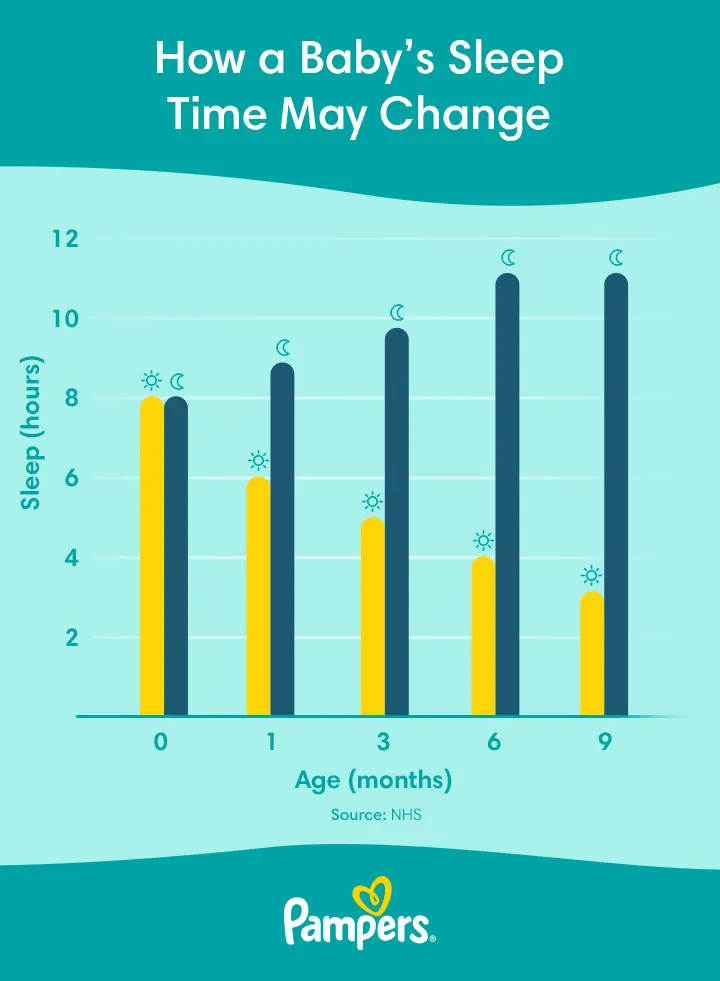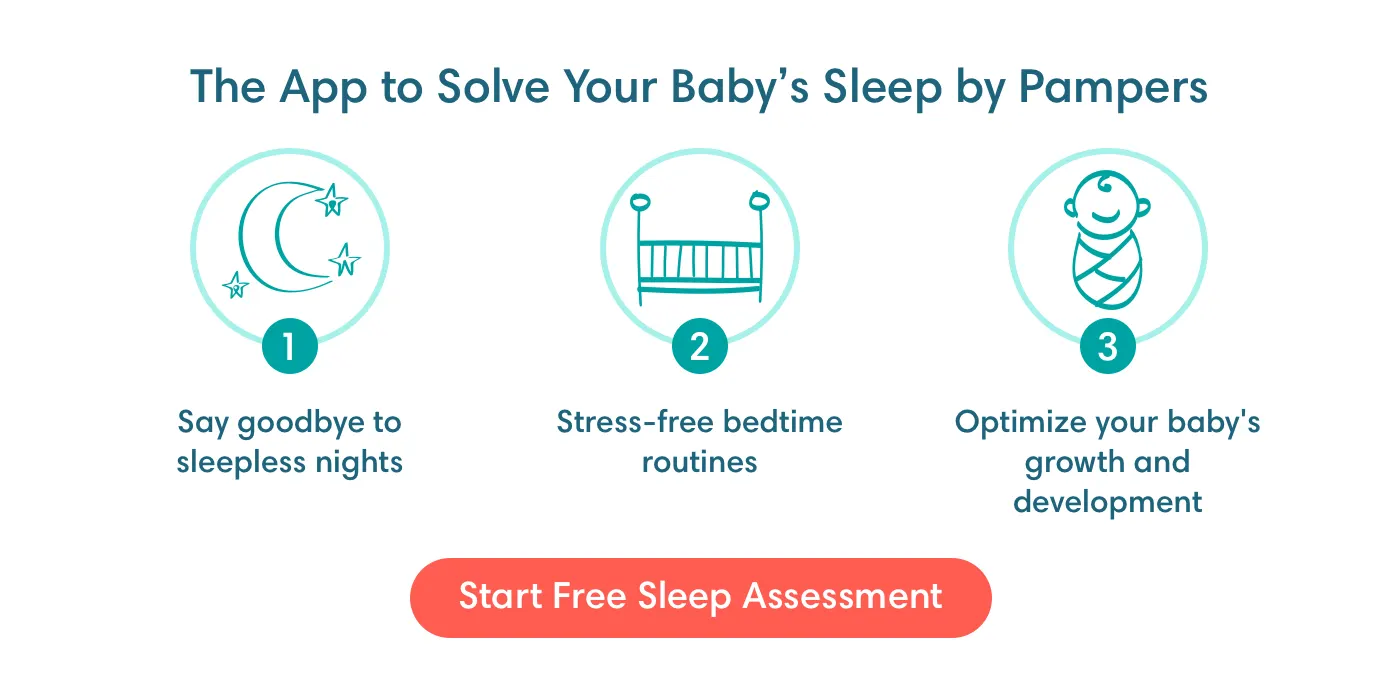When Do Babies Sleep Through the Night?
As a new parent, one of the biggest challenges you may face is getting your baby to sleep through the night. It’s common to wonder when do babies start sleeping for longer stretches through the night without waking up, and when can they stop feeding during the night. There’s plenty you can do to encourage better sleep, but it's important to remember that sleep patterns can take time to become established and vary from baby to baby. They also tend to change as your little one gets older. In this article, we will explore all the common questions, such as ‘When do most babies sleep through the night?’ and ‘What is considered sleeping through the night?’ And we’ll also give some helpful tips on how you can help your baby develop good sleep habits.
What Is Considered Sleeping Through the Night?
The query ‘When do babies start sleeping through the night’ can be a bit misleading as no one, not even adults, sleeps through the night completely. Regular periods of wakefulness and returning to sleep are a natural part of the sleep cycle. It’s pretty common for babies to wake throughout the night during their first year, in fact, frequent wakings may actually be beneficial to your baby in their first few months of life as they may help reduce the risk of SIDS (Sudden infant death syndrome). Once your baby gets older, they may naturally begin to sleep for longer periods of time at night, such as 8 hours at a time, and this may be considered as ‘sleeping through the night.’ It is important to remember that daytime and night-time sleep are crucial for a baby's development. Thus, if your baby is not getting enough sleep at night, daytime naps can help compensate for it.
When Do Babies Sleep Through the Night?
If you’re looking forward to those peaceful nights when your little one ‘sleeps through the night,’ or at least sleeps for longer periods of time at night, this sometimes occurs around 3 to 6 months. This is when it’s typical for babies to need fewer night feeds. Between 6 and 12 months, babies may start developing a clearer sleep cycle, with most of their sleep during the night. It's important to keep in mind that every baby is different, including their sleep cycle. Some babies simply sleep more than others. Your baby’s sleep patterns may also vary considerably throughout the first year, so it’s important to be prepared for disruptions along this journey! Just when you think your little one has started sleeping through the night, they may surprise you again with frequent night wakings. This is normal, especially as they grow and go through developmental changes.
How Do Babies Learn to Sleep Through the Night?
To sleep through the night, it’s helpful for your baby to learn to self-soothe/ self-settle after waking. Self-soothing will help them feel safe and comfortable enough to fall back asleep alone without crying out for you. However, this may take some time and patience for babies to learn. Some babies may learn to self-soothe without any help, whilst others may need a little help from the sleep training method commonly known as the Ferber method or controlled self-soothing. Every baby is unique, and many factors can affect your little one's sleep patterns, even things like your child’s genetic makeup and temperament. If you decide to try sleep training to help your little one sleep through the night, it’s recommended to wait until they’re 6 months or older. To help you on this journey, we recommend checking out the *Smart Sleep Coach app by Pampers. *only available in the UK on IOS devices Backed by experts and loved by parents, this easy-to-use app teaches you everything you need to know about your baby’s sleep and how to work with their natural rhythms to help them fall asleep faster, stay asleep longer and reduce night waking.
When Do Babies Sleep Through the Night Naturally?
Are you wondering, ‘When do babies sleep through the night without sleep training?’ Well, although sleep training can be a helpful tool to support and encourage your baby’s sleeping, it’s not necessarily a requirement for your baby to sleep through the night. In fact, the NHS recommends gentle approaches to sleep, such as a calm sleep environment and a relaxing bedtime routine. Certain sleep training methods may be helpful in addressing specific sleep issues; however, many babies start sleeping for longer stretches at night between 3 and 12 months – so, be patient and know that it’s normal for babies to wake at night.
Night-time Sleep Patterns by Age Group
Your baby's age may be a key factor in how long they sleep at night and whether they can get back to sleep by themselves. We’ve described some typical scenarios below, but for more personalised advice, speak to your baby’s GP or health visitor, who can address any questions or concerns about their sleep patterns.
Your Newborn: Short Bursts of Sleep
In their first month or so, newborn babies generally sleep most of the time and wake every few hours, day and night to feed. Your baby may also wake up if they’re too hot or too cold. All babies are different, and this is especially true when it comes to the amount of sleep they need. As a rough guide though, your newborn baby’s sleep pattern could range from 8 up to 16 to 18 hours in total during a 24-hour period. This may sound like more than enough for both of you, but there’s a catch: This total will usually be spread across about seven separate sleep periods that happen both during the day and night. This is why this first month or two might seem like the hardest on you, as having to get up several times during the night to tend to your baby will leave you feeling exhausted. If you can, take naps during the day to help keep your own energy levels up, and try to be patient. It takes time for a routine to develop; but sleeping through the night may not be too far off for your baby and you.
3 to 6 Months: Longer Stretches of Night-Time Sleep
By the time your little one is 3 months old, they won’t need as many night feeds and may be sleeping for longer stretches during the night. By now the total sleep requirement may have dropped a little to around 14 to 15 hours per day, and the number of times your little one nods off may also have decreased to about 4 or 5 sleep periods every 24 hours. Some babies may already sleep for eight or more hours during the night by this stage; but be patient if this isn’t the case yet for you – every baby’s sleep pattern develops at a different pace. From around the age of 4 months, your baby may be spending around twice as much time sleeping at night as during the day.
6 to 12 Months: When Sleeping Through the Night Might Start
At 6 months old your baby may no longer wake up to be fed at night, so there’s a chance they could be sleeping for stretches of up to 12 hours at night. Keep in mind, though, that even if regular night-time feeds are a thing of the past, the periods of cluster feeding associated with growth spurts, occasional hunger pangs or other kinds of discomfort – such as teething pain – may still disrupt your little one’s sleep from time to time. Between 6 and 10 months is the period when your baby starts getting much more active and mobile, as they begin rolling over and later learning to crawl. All these activities could tire your baby out, leading to longer periods of sleep at night. By around the time of your baby’s first birthday and beyond, they could be sleeping for a total of around 12 to 15 hours. In practice, this could translate into around 11 hours during the night, and a couple of hour-long naps during the day. Just remember that these typical scenarios are only a rough guide, and they don’t mean that your little one won’t wake up during the night occasionally. Also keep in mind that, depending on when you put your baby to bed, your little one may wake up very early in the morning even after a relatively long block of sleep. This means you, as the parent, won’t necessarily be getting a ‘full night’s sleep’ or ‘sleeping through the night’ just yet. For example, if you put your baby to bed at 7 pm, even after 9-11 hours of uninterrupted sleep they could wake up around 4-6 am, which might still be an early wake-up call for you. Take a look at our chart below for a rough idea of how your baby’s sleep pattern may change as they get older. Remember, though, every baby is different, so their sleep patterns may not match the chart – and it’s normal for them to go through periods of waking at various stages of infancy.

Tips for Getting Your Baby to Sleep Through the Night
First, it's important to remember that very young babies can’t sleep through the night, as they need feeds, nappy changes and sometimes just a little comforting. Still, from about the time your little one is 3 months old there are some things you can do to encourage them to sleep for longer stretches at night:
Help your baby learn the difference between day and night by keeping things bright and active during the day, but dark and quiet in the night. At night keep feeds and nappy changes calm and quiet.
Establish a bedtime routine. This could include calming activities like a warm bath, baby massage, cuddling, bedtime stories or lullabies. Soon your baby will start to recognise and expect the routine you’ve established and associate it with bedtime.
If your baby wakes up in the night, give them some time to settle before checking on them. If your baby isn’t settled, a few reassuring words softly spoken from the bedroom doorway or a loving pat may be enough. If a feeding or nappy change is needed, keep the atmosphere calm and place your little one back to sleep in their cot afterwards.
Put your baby in their cot before they fall asleep. It’s best to allow your baby to fall asleep in their cot rather than in your arms. This may prevent them from getting upset if they wake up and they’re no longer in your arms.
Try the *Smart Sleep Coach by Pampers to receive personalised sleep guidance and resources tailored to your baby's unique needs, ensuring a restful night's sleep. No matter what sleep challenges your little one may have, take our free sleep assessment and unlock the potential for a peaceful slumber. *only available in the UK on IOS devices
Baby Sleep Problems: Why Your Baby May Not Be Sleeping All Night
There are many reasons your little one may wake up and cry at night. It’s normal for newborns to wake repeatedly in the night, but even older babies who sleep soundly can change their sleep patterns unexpectedly – for example, during growth spurts or when teething starts. As your baby gets older, another reason they may cry out instead of sleeping through the night is separation anxiety.
Separation Anxiety at Night
After about 6 months of age, your little one might show signs of separation anxiety. This may lead your baby to cry out for you if they wake up in the night and find that you’re not there. Your baby is starting to understand how dependent they are on you, and that you have gone away (even if you’re just in the next room). It’s OK to reassure and comfort your child if they seem to be feeling anxious at night. Often just picking your baby up and letting them know that you’re still there may be enough. Periods of sleeplessness can be exhausting, but rest assured they’ll pass eventually. If you’re unsure why your baby is crying at night, talk to your health visitor for personalised advice and to make sure that everything is OK with your little one.
A Note About Breastfed and Bottle-fed Babies
When do breastfed babies sleep through the night, and is the timing different if you’re formula feeding? Research suggests that bottle-fed babies tend to sleep for longer periods; however, this sleep is unlikely to be of any better quality than breastfed babies. There’s little evidence to suggest much of a difference between the two. Remember, as your baby gets older, they’ll start to need fewer night-time feeds. But for now – as tired as you may be – make the most of those midnight snuggles with your little one. And you can also ask your partner or a friend/ family member to take over a few feedings during the day or night. If you’re breastfeeding, you could consider using bottles of expressed milk when you and your baby have established your breastfeeding routine.
When to Consult Your Child’s Doctor
Besides anxiously wondering ‘When do babies start sleeping through the night?’ many parents also wonder if they should worry when their little ones aren’t sleeping through the night. Remember that every child grows and develops at their own pace, so it’s OK if yours isn’t sleeping through the night yet, even up to 12 months. If you’re concerned about your baby’s sleep or health, or you simply need more advice, contact your little one’s GP or health visitor.
FAQS AT A GLANCE
Babies can typically sleep for longer periods of time at night without feeding between 6 to 12 months of age. However, this can vary depending on the baby's individual needs and development. Even as adults we don’t always ‘sleep through the night,’ so be patient and expect a few hiccups along the way.
The Bottom Line
Sleeping through the night (or for longer periods of time at night) is a milestone that your child will eventually reach. It takes time and patience on your part, along with maintaining the kind of environment that encourages your little one to sleep for longer blocks of time during the night. So, when do babies start sleeping through the night (and when will you start getting more sleep at night, too)? Although it’s hard to predict, many babies begin to sleep for longer periods after 3 months, and between 6 and 12 months, that generally increases, with longer periods of sleep at night. Though you may be feeling a little frazzled and sleep-deprived at the moment, this period of sleepless nights will eventually pass. Hang in there!
How We Wrote This Article The information in this article is based on the expert advice found in trusted medical and government sources, such as the National Health Service (NHS). You can find a full list of sources used for this article below. The content on this page should not replace professional medical advice. Always consult medical professionals for full diagnosis and treatment.
Read more about Newborn Baby
Join Pampers Club and get:






